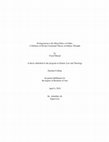Papers by Yusuf Shah Masud
Sayyid Qutb was amongst the avant-garde of the cadre of Muslim intellectuals who attempted to add... more Sayyid Qutb was amongst the avant-garde of the cadre of Muslim intellectuals who attempted to address the epistemological crisis. His work operates squarely under the assumption that the state of the Muslim umma is in desperate need of revival. He sought to address how this came to be and suggest ways to actualize an alternative future. Central to this project was his reconceptualization and rearticulation of the long-established term “jāhiliyya.” The following discussion will take Qutb’s conception of jāhiliyya as its point of departure in examining how he grappled with his perception of the larger epistemological crisis facing the Muslim world.

The purpose of this paper is to outline the meta-ethical system that most aligns with normative S... more The purpose of this paper is to outline the meta-ethical system that most aligns with normative Sunni Islāmic theology and to present contending systems in order to articulate why they are not consistent with mainstream Sunni theology. The primary argument is that such a meta-ethical system does in fact exist and is largely congruent with a contemporary paradigm known as “divine command theory.” The way this is established is by looking at different meta-ethical categorizations and determining what elements are or are not reconcilable with Sunni theology. The noteworthy systems that are not reconcilable — namely emotivism, moral
objectivism, and evolutionary ethics — are examined separately to facilitate a defense of divine command theory in relation to them. The significance of this project is due to the fact that a modern and comprehensive account of divine command theory from a strictly Islāmic worldview is yet to be developed, and this paper lays the groundwork for such an account.
Uploads
Papers by Yusuf Shah Masud
objectivism, and evolutionary ethics — are examined separately to facilitate a defense of divine command theory in relation to them. The significance of this project is due to the fact that a modern and comprehensive account of divine command theory from a strictly Islāmic worldview is yet to be developed, and this paper lays the groundwork for such an account.
objectivism, and evolutionary ethics — are examined separately to facilitate a defense of divine command theory in relation to them. The significance of this project is due to the fact that a modern and comprehensive account of divine command theory from a strictly Islāmic worldview is yet to be developed, and this paper lays the groundwork for such an account.